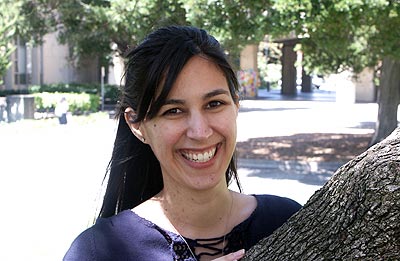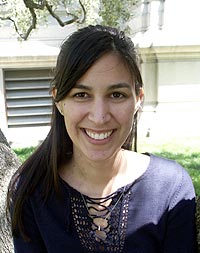UC Berkeley Web Feature
 |
Deann Del Rio, psychology major and University Medal finalist. (BAP photos) |
After changing her major and her mind, Deann Del Rio takes on modern medicine
BERKELEY – More freshmen begin UC Berkeley aspiring to work in medicine than in any other field, but quite a few subsequently change their minds once they discover how difficult the pre-med path is. University Medal finalist Deann Del Rio, however, decided to become pre-med only in her last year of college and after a very circuitous path. A fiercely independent thinker, Del Rio won't be accompanying her Berkeley classmates to Harvard Medical School, either: she intends to become a midwife.
The University Medal
Finalists: |
Born and raised in Upland, California, Del Rio tutored fellow students all throughout junior high and high school, was a peer counselor, and worked with children at a daycare center. She came to UC Berkeley thinking she would study psychology, her lifelong love, but decided that the university's relatively new cognitive science major would offer more stimulating exposure to such peripheral aspects of psychology as neuroscience and psycholinguistics. Taking the computer science requirement for the major led her to a job grading and tutoring students for the Computer Science department.
Around that time – Del Rio was a sophomore – she became disenchanted with the cognitive science major. She decided to switch her major to psychology, but due to a bureaucratic glitch was unable to enroll officially in the extremely popular major until the following year.
Despite the rocky road she had to travel to reach her goal, Del Rio says that fellow students shouldn't be put off by all the obstacles to changing a major. "Just make it clear that you're passionate about what you're doing, and that you'll do whatever you have to do to make it work," she advises.
Speak, memory
Even while still in limbo between majors, Del Rio set out to find a challenging psychology research project that she could do over the summer. After reading about Alan Hartley's research on the neuroscience and psychology of aging, she wrote to Hartley, a psychology professor at Scripps College, a small liberal arts college in Claremont, California, asking for an internship. Although Hartley until then had reserved his lab positions for Scripps students, after talking to her Berkeley professors he offered her a job for the summer.
"She was superb in the laboratory," writes Hartley in a letter recommending Del Rio for the University Medal. "I have never had a student - at any level - who could master detail so quickly and then get past it to look at the deeper, abstract questions." Under Hartley's guidance, Del Rio began research for a senior thesis. Theorizing that there might be a special working memory designed to handle spoken language, just as similar sub-memories have been proven to exist for things such as spatial location, Del Rio set out to discover whether this language-specific memory might resist declining with age. She won a grant of more than $20,000 from the National Institute on Aging to conduct the research, which continued the following summer and part of last spring.
 'We place our faith in technology over everything else, including over the body's power to heal itself and the beneficial effects of human interaction. U.S. medicine perceives birth as pathology, and that perpetuates it being intertwined with medical intervention and surgery. ' -Deann Del Rio |
After writing computer programs to test subjects' language/memory, she guided 48 people through hours of tests, and did all the data analysis herself - "quite a feat, considering that she still had not been allowed to enroll in Berkeley's basic statistics class," writes Hartley, referring to the snafu over Del Rio's switching her major to psychology.
Del Rio presented her thesis research before the Western Psychological Association and American Psychological Association meetings, a great honor for an undergraduate. The work has not yet been published, because — as with her academic career — Del Rio ran into an unexpected obstacle. Part of her research failed to replicate work by a leading researcher in the field. That means that before she can draw firm conclusions about language-specific memory, Del Rio would have to repeat a portion of her experiments to prove that the previous accepted methodology is flawed.
"It is both telling and interesting that Deann has become embroiled in politics of science that many researchers never encounter and those that do, encounter well into their careers," writes Hartley.
Birth of a dream
Shortly after this language/memory project, Del Rio took a one-credit, student-led DeCal class on integrative medicine that introduced her to what she feels is finally her true calling. A guest lecture by UC Berkeley ethnobotanist Tom Carlson shined a spotlight on the difference between U.S. and world birthing practices, and on America's poor showing in infant mortality rates.
"For all the money the United States throws at maternal/infant health, we still rank something like 22nd in infant mortality," Del Rio says. "Given what the rest of the world spends compared with us, that's shocking." She soon found herself obsessively reading about birth, obstetrics, and midwifery.
The problem with U.S. birthing practices is technology, in Del Rio's opinion. "We place our faith in technology over everything else, including over the body's power to heal itself and the beneficial effects of human interaction," she argues with passion. "U.S. medicine perceives birth as pathology, and that perpetuates it being intertwined with medical intervention and surgery. Don't get me wrong: there's that 1 percent of pregnancies that need help, and we do an amazing job for them. But that same technology can hinder the other 99 percent of normal births."
Through the DeCal class and after much reading on her own, Del Rio became convinced that medicine is shaped as much by cultural differences as it is by science. She also realized she desperately wanted to change the way medicine is practiced in the United States.
Her senior year, she decided to become pre-med. For financial reasons, she opted to finish a few Berkeley requirements at Merritt College in Oakland, where she has also begun pre-med courses, such as anatomy/physiology and microbiology. She will graduate this month from Berkeley with her bachelor's in psychology, then finish the pre-med requirements at Merritt.
Despite her perfect 4.0 grade point average and stellar recommendations, she intends to avoid the major medical schools. "I don't think I can change them from within," she explains. "I'm afraid that the type of education they provide, that seeks to desensitize students so they can practice mainstream medicine, will end up desensitizing me too, and I don't want that."
Instead, she intends to train to be a midwife at an alternative medicine school or through a nursing program. She expects to practice midwifery for a few years before pursuing a master's of public health degree. "That way, I'll have day-to-day experience that will help inform my methods later on," she explains. "Long term, I want to change how we get research about alternative medicine and therapies into the educational setting, as well as streamline the licensing and reimbursement of naturopathic and other alternative practitioners."
Once again, Del Rio is embarking on a tough road - humanizing modern medicine is quite a considerable challenge. She admits to feeling a certain amount of trepidation, then shrugs gamely. "Change has to start somewhere," she says.


 University
Medalist Margaret Ann-Chia Chow urges new students
to make campus "feel like home"
University
Medalist Margaret Ann-Chia Chow urges new students
to make campus "feel like home" Leadership depends on dialogue, says ex-ASUC president
Jesse Gabriel
Leadership depends on dialogue, says ex-ASUC president
Jesse Gabriel From Istanbul to Berkeley, Perin Gurel is on the lookout for new challenges
From Istanbul to Berkeley, Perin Gurel is on the lookout for new challenges David Young relies on faith and family to bring his
vision to life
David Young relies on faith and family to bring his
vision to life Would-be
physician Maria Garcia gives back to the Latin-American
community
Would-be
physician Maria Garcia gives back to the Latin-American
community After changing her major and her mind,
Deann Del Rio takes on modern medicine
After changing her major and her mind,
Deann Del Rio takes on modern medicine